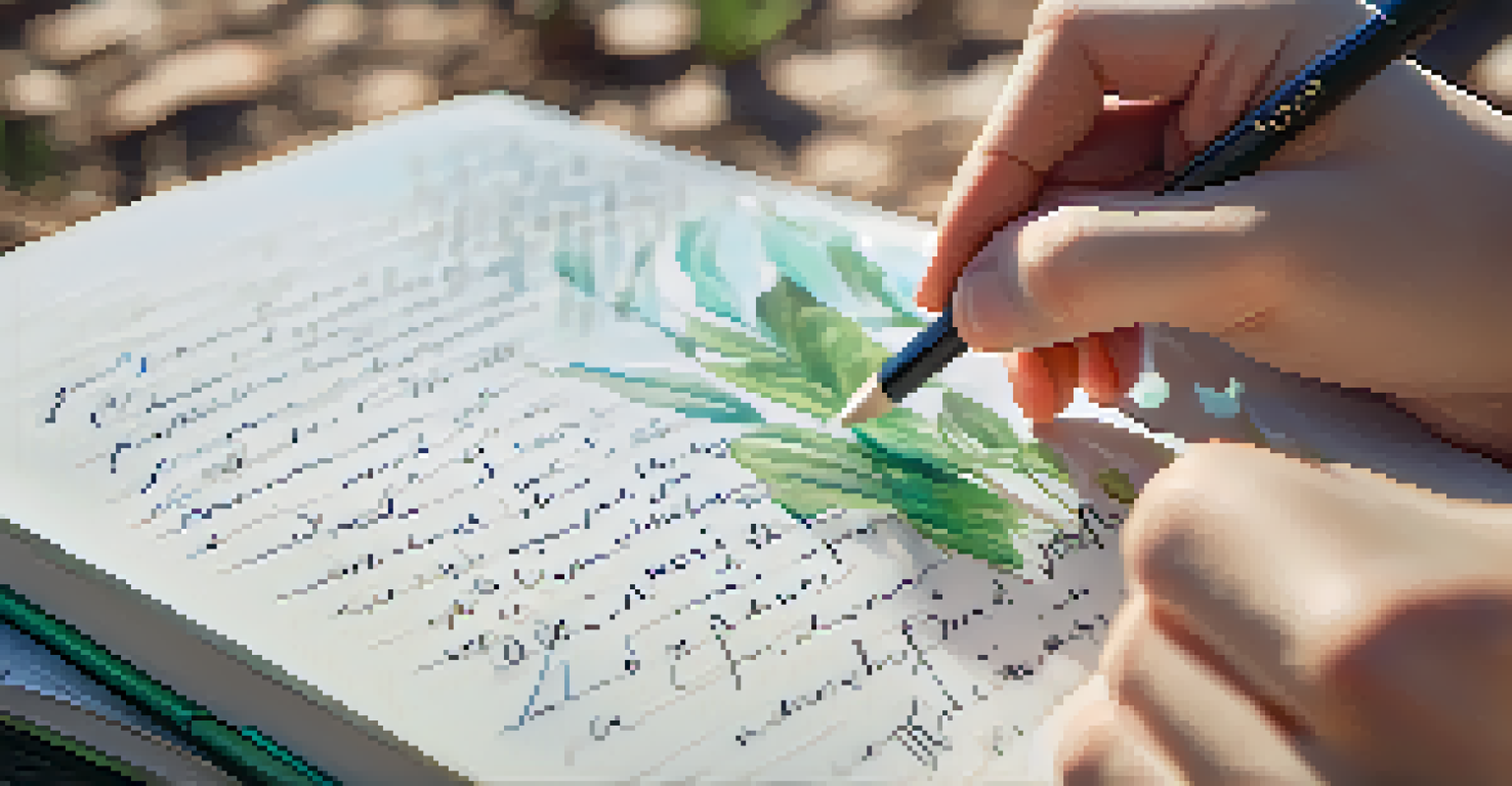The Benefits of Journaling: Enhancing Mental Clarity

Understanding the Power of Journaling for Mental Clarity
Journaling is more than just putting pen to paper; it’s a powerful tool for mental clarity. When we write down our thoughts, feelings, and experiences, we create a space to reflect and process our emotions. This practice helps declutter our minds, making it easier to focus on what truly matters in our lives.
Journaling is like whispering to one's self and listening at the same time.
By externalizing our thoughts, journaling allows us to see patterns in our thinking that we might otherwise overlook. It’s like shining a flashlight into the dark corners of our minds, illuminating areas that need attention. This clarity can lead to better decision-making and a deeper understanding of ourselves.
Additionally, the act of writing can be therapeutic. Many people find that journaling serves as an emotional release, reducing stress and anxiety. Just as a messy room can feel overwhelming, a cluttered mind can hinder our ability to think clearly, and journaling offers a way to tidy up our mental space.
Boosting Creativity Through Regular Journaling
One of the surprising benefits of journaling is its ability to enhance creativity. Writing regularly can help unlock new ideas and perspectives, acting as a catalyst for inspiration. When we give ourselves the freedom to write without judgment, we tap into our creative potential in ways we might not expect.

Think of journaling as a workout for your brain; just as physical exercise strengthens your body, writing exercises your mind. By allowing your thoughts to flow uninhibited, you create a rich reservoir of ideas to draw from later. This practice can lead to breakthroughs in problem-solving or artistic endeavors.
Journaling Enhances Mental Clarity
Writing down our thoughts helps us reflect, declutter our minds, and gain better decision-making insights.
Moreover, keeping a journal can help track your creative journey. By revisiting older entries, you can identify growth and shifts in your thinking. This reflection not only boosts confidence but also fuels your passion for creativity, reminding you of how far you’ve come.
Developing Emotional Intelligence Through Writing
Journaling is a powerful tool for enhancing emotional intelligence. By writing about our feelings and experiences, we can better understand our emotional responses and triggers. This self-awareness is crucial for building stronger relationships and navigating complex social situations.
Write down the things you want, and write down the things you don't want. Write down your thoughts, and write down your feelings.
As we articulate our feelings on paper, we gain clarity about what we truly feel and why we feel that way. This process helps us distinguish between emotions like anger, sadness, and frustration, leading to healthier coping strategies. Understanding our emotions can also help us respond instead of reacting in challenging situations.
Furthermore, journaling fosters empathy as we reflect on our experiences and those of others. By writing about interactions or conflicts, we can step back and view things from different perspectives. This practice encourages compassion and understanding, essential components of emotional intelligence.
Setting and Achieving Goals Through Journaling
Journaling can serve as a powerful tool for goal-setting and achievement. When we write down our goals, we create a tangible commitment to ourselves. This simple act can significantly increase our likelihood of following through on our aspirations.
By breaking down larger goals into smaller, manageable steps in our journals, we can track our progress over time. This not only provides motivation but also allows us to celebrate small victories along the way. The act of writing our goals makes them feel more real and achievable.
Boost Creativity with Writing
Regular journaling acts as a creative exercise, unlocking new ideas and perspectives while tracking our creative growth.
Moreover, journaling encourages accountability. By documenting our journey, we can reflect on what worked and what didn’t, adjusting our approach as needed. This self-reflection can be invaluable in staying on course and maintaining momentum toward our goals.
Gaining Perspective and Clarity Through Reflection
One of the most rewarding aspects of journaling is the ability to gain perspective on our experiences. When we take the time to reflect on our day or specific events, we can see them in a new light. This process often reveals insights that help us navigate future challenges more effectively.
Imagine journaling as stepping back from a painting to see the whole picture. Up close, we might focus on the details, but from a distance, we can appreciate the overall composition. Similarly, reflection allows us to contextualize our experiences, reducing their emotional intensity.
This perspective is particularly beneficial during difficult times. Writing about our challenges can help us identify solutions or simply provide a sense of relief. By acknowledging our struggles on paper, we create distance from them, allowing us to approach issues with a clearer, calmer mindset.
Cultivating Mindfulness Through Daily Journaling
Journaling can also be a gateway to mindfulness, encouraging us to be present in the moment. By taking time each day to write, we create a ritual that fosters awareness of our thoughts and feelings. This practice can help us appreciate the small joys in life that often go unnoticed.
When we focus on capturing our thoughts on paper, we train ourselves to observe our surroundings and experiences more deeply. This heightened awareness can lead to a greater appreciation for life’s simple pleasures, from a warm cup of coffee to a beautiful sunset.
Journaling Fosters Emotional Intelligence
By articulating our feelings in writing, we gain self-awareness and empathy, which are crucial for building stronger relationships.
Additionally, journaling provides a safe space to process our thoughts without judgment. This freedom of expression can help us let go of worries and anxieties, promoting a sense of calm. As we become more mindful, we can navigate life’s ups and downs with greater ease and resilience.
Creating a Personalized Journaling Practice for Success
Establishing a journaling practice that works for you is key to reaping its benefits. There’s no one-size-fits-all approach; it’s about finding what resonates with you. Whether it’s free writing, bullet journaling, or guided prompts, the important thing is to make it a regular habit.
Start small—set aside just a few minutes each day to jot down your thoughts. As you become more comfortable, you can expand your sessions or explore different styles. The goal is to create a practice that feels enjoyable and rewarding, rather than a chore.

Remember, journaling is a personal journey, and there’s no right or wrong way to do it. Embrace your unique voice and allow your thoughts to flow freely. With consistency, you’ll likely discover the profound impact journaling can have on your mental clarity and overall well-being.